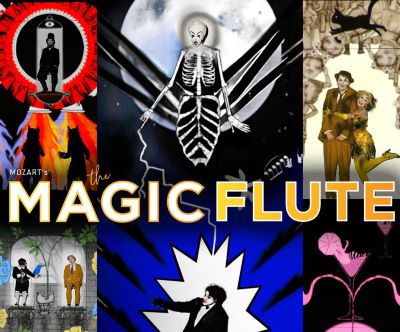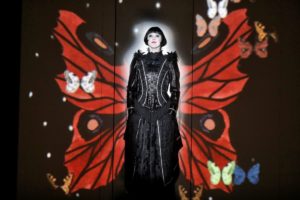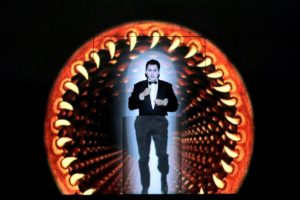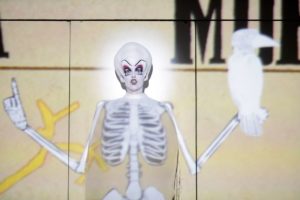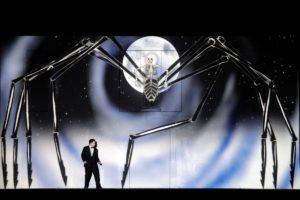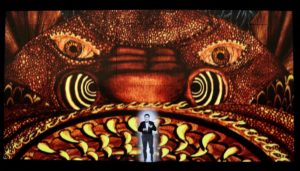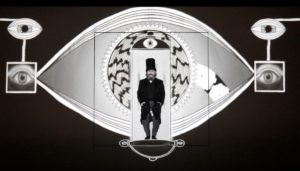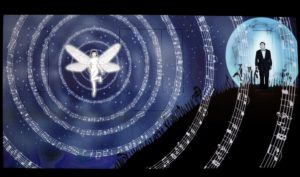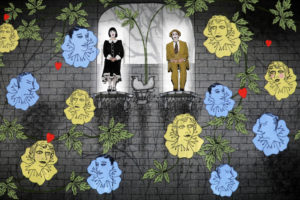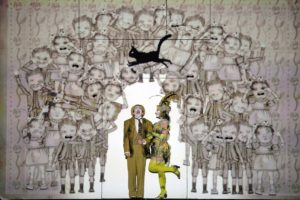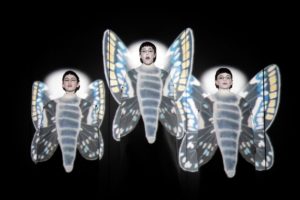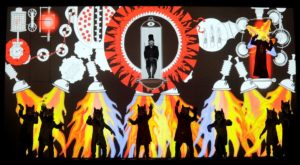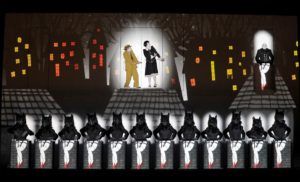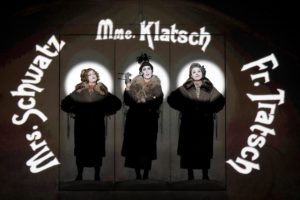THE WHIMSICAL FLUTE
How to illustrate such whimsy: Chaplin on a Seussian sleigh, perhaps, belting an aria from Metropolis into the bowels of Dante’s Inferno. That’s as succinctly I can describe the magic awaiting audiences this holiday season in LA Opera’s dazzling production of Wolfgang Amadeus Mozart’s The Magic Flute (Die Zauberflöte). The fact that one of the most beloved operas of all time is a fairy tale with a German libretto (Emanuel Schikaneder) makes it a perfect candidate for poetic fantasy and German Expressionism.
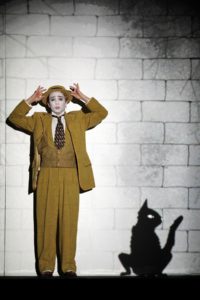 This unique production premiered at the Komische Oper Berlin in 2012 and is co-directed by Barrie Kosky and Suzanne Andrade in collaboration with fellow animation designer Paul Barritt. (Andrade and Barritt are co-creators of the British theater company 1927.) Alongside associate director Tobias Ribitzki, they present The Magic Flute as a silent film brought to operatic life, complete with intertitles of condensed dialogue. A two-story white wall replaces a more traditional set. Upon this “movie screen,” hand-drawn animations (including fantastical creatures and various locales) are projected — a world which would be nearly impossible to create using only a physical set. The projections vary in style while maintaining a cohesive aesthetic. They’re often comically unconventional and symbolic, providing an imaginative counterpart to the opera’s more straightforward lyrics. While the opera is in German, English supertitles appear high above the stage — something audiences up close may have a hard time craning their necks to read.
This unique production premiered at the Komische Oper Berlin in 2012 and is co-directed by Barrie Kosky and Suzanne Andrade in collaboration with fellow animation designer Paul Barritt. (Andrade and Barritt are co-creators of the British theater company 1927.) Alongside associate director Tobias Ribitzki, they present The Magic Flute as a silent film brought to operatic life, complete with intertitles of condensed dialogue. A two-story white wall replaces a more traditional set. Upon this “movie screen,” hand-drawn animations (including fantastical creatures and various locales) are projected — a world which would be nearly impossible to create using only a physical set. The projections vary in style while maintaining a cohesive aesthetic. They’re often comically unconventional and symbolic, providing an imaginative counterpart to the opera’s more straightforward lyrics. While the opera is in German, English supertitles appear high above the stage — something audiences up close may have a hard time craning their necks to read.
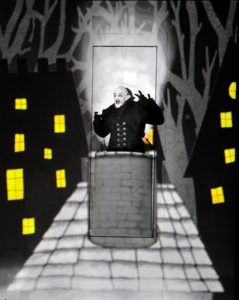 The Magic Flute is a singspiel, combining music and spoken dialogue. It premiered over two centuries ago in Vienna, Austria, two months before Mozart’s untimely death at 35. At its heart, it’s a fairy tale, appealing to children and adults alike. More philosophically, it’s a means for Mozart and Schikaneder — both Freemasons — to champion noble virtues of Enlightenment while still providing the high drama people expect from an opera. It is a love letter to both human potential and humanity as it presently exists.
The Magic Flute is a singspiel, combining music and spoken dialogue. It premiered over two centuries ago in Vienna, Austria, two months before Mozart’s untimely death at 35. At its heart, it’s a fairy tale, appealing to children and adults alike. More philosophically, it’s a means for Mozart and Schikaneder — both Freemasons — to champion noble virtues of Enlightenment while still providing the high drama people expect from an opera. It is a love letter to both human potential and humanity as it presently exists.
The story is a Hero’s Journey: a handsome prince, Tamino (Bogdan Volkov), is tasked with rescuing Pamina (Zuzana Marková), the beautiful daughter of the Queen of the Night (Jeni Houser). Pamina has been held captive in a temple of the high priest, Sorastro (Ildebrando D’Arcangelo). Tamino, on his quest to rescue the fair maiden and claim her as his true love, is accompanied by a jolly simpleton, Papageno (Theo Hoffman), who’d be much happier if only he could find a wife. With magical instruments and cherubic spirit guides as their only companions, they embark on a journey on which many trials await.
Homages to the 1920s and its heroes (Buster Keaton, Louise Brooks, Nosferatu, etc.) are merely a springboard for this productions’ flights of fancy. It doesn’t confine itself to that era or aesthetic; it gives itself the freedom to play. The performers, however, don’t have the same luxury. They’re often confined to very specific spots, sometimes standing on a small ledge high on stage. Instead of interacting with one another, they’re frequently facing the audience. The animations are so precise, their bodies must be perfectly aligned to match it. (If an extended arm is off even a few inches, it could bumble the illusion.) Nevertheless, what the production lacks in free-roaming interplay among performers it makes up for in spectacle. A large part of that is Esther Bialas’s inventive, highly theatrical scenery and costume designs and the artful make-up on display.
Conductor James Conlon’s musical direction is grand, taking its time to fill the hall with Mozart’s majesty. Not only is the LA Opera Orchestra’s music sublime, a side-staged 18th-century fortepiano on which two of Mozart’s fantasias (K. 475 in C minor and K. 397 in D minor) are played, harkens back to the music of silent film. Also impressive are the opera’s sacred choral numbers.
In the role of Prince Tamino, Volkov is valiant and noble, though he comes across square next to his delightful sidekick Papageno, played by the comically loveable Hoffman. Marková is deeply resonant as Pamina, the damsel in distress; her 11th hour “dark night of the soul” is profoundly moving.
D’Arcangelo is commanding as the idealistic, headstrong Sarastro. Frederick Ballentine as Sarastro’s Moor servant, Monostatos, is creepy as hell. Because Ballentine (who is black) portrays Monostatos as a ghost-white vampire, it removes the racist undertones inherent in this lecherous role. Child performers David Kakuk, Thomas Quinn Fagan, and Anika Erickson are positively angelic as the cherubic spirits. Likewise, Erica Petrocelli, Vivien Shotwell, and Taylor Raven are sassy and satisfying as the Queen’s three attendants.
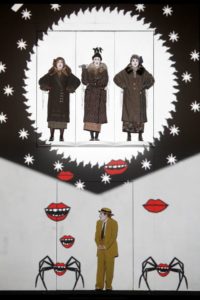 As for the opera’s iconic “mother role,” Jeni Houser (replacing an indisposed So Young Park for the rest of the run) proves merely capable as the Queen of the Night, portrayed in this production as a giant spider. (Only Houser’s face, covered in make-up and prosthetics, is visible; her “body” is entirely animated.) Houser hits every sky-high note in the infamous Queen of the Night aria (“Der Hölle Rache”). While technically impressive, she doesn’t bring the vengeance and rage required of the role, layers which get caught in a web of vocal demands.
As for the opera’s iconic “mother role,” Jeni Houser (replacing an indisposed So Young Park for the rest of the run) proves merely capable as the Queen of the Night, portrayed in this production as a giant spider. (Only Houser’s face, covered in make-up and prosthetics, is visible; her “body” is entirely animated.) Houser hits every sky-high note in the infamous Queen of the Night aria (“Der Hölle Rache”). While technically impressive, she doesn’t bring the vengeance and rage required of the role, layers which get caught in a web of vocal demands.
Times have certainly changed since The Magic Flute premiered in 1791. In the work, each gender, class, and race has their defined role, a place in the world out of which they dare not step. This theme is made all the more evident in a staging where actors are similarly confined, though through their order great beauty is achieved. And yet, in the show’s final moments, this order is restructured. A new era dawns, trumpeting a world where equality, love, and reason are celebrated. No matter how this story is told — and this unique, stylized production tells it magically — at its journey’s end a more harmonious world begins. Especially in a work plagued with the biases of its day, there’s nothing as timeless and forgiving as that.
Cast/Conductor changes:
Tamino: Bogdan Volkov (Nov. 16 – Dec 1); Joshua Wheeker (Dec. 12-15)
Conductor: James Conlon (Nov 16-23); Grant Gershon (December 1-15)
photos by Cory Weaver
The Magic Flute
1927 Theater Company
presented by Los Angeles Opera
at the Dorothy Chandler Pavilion
ends on December 15, 2019
for tickets, call 213.972.8001 or visit LA Opera
